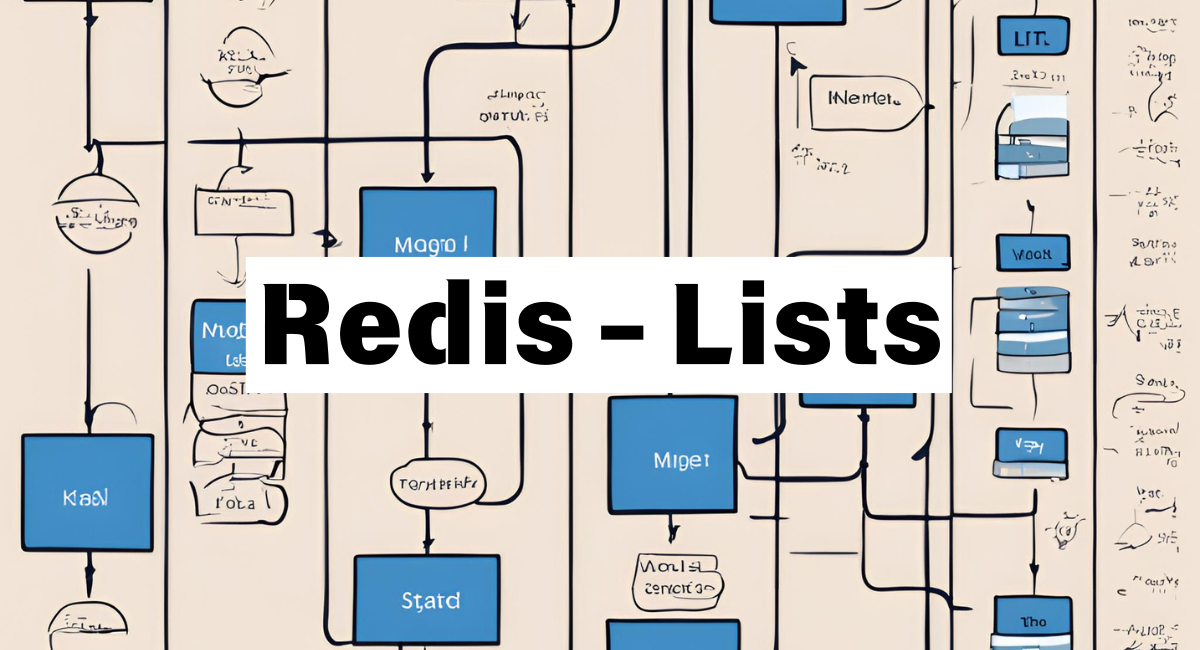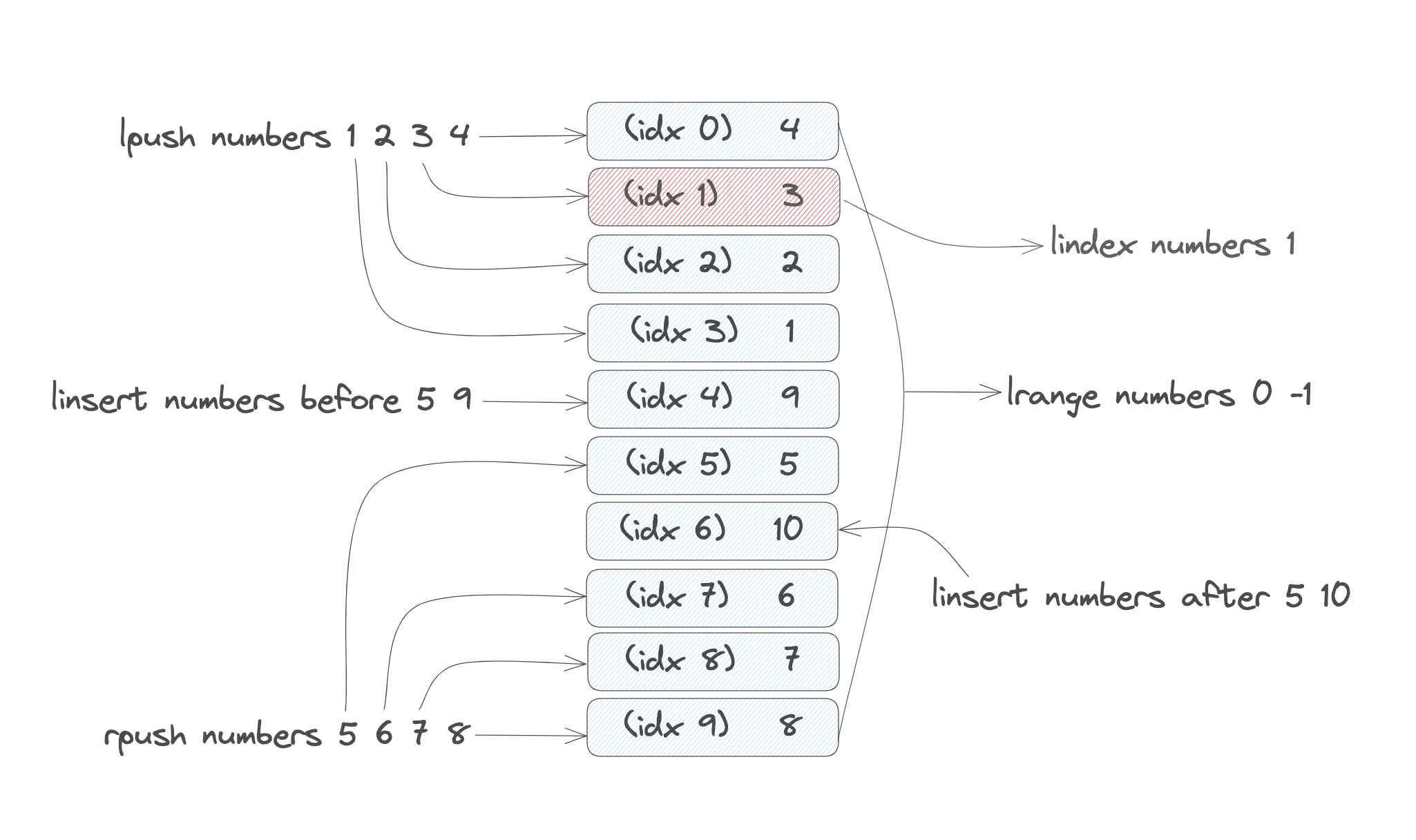Redis Lists
Redis - Lists
- Lists are a flexible data structure in Redis.
- A list is a simple collection of elements.
- It stores a sequence of objects in an ordered manner.
- The order of elements is based on the sequence in which they are inserted.
- Lists can be encoded and optimized for memory.
- From a programming perspective, a list is similar to an array.
- Elements in a list are strings.
- A list can contain more than 4 billion elements.
Commands
❯ Prepends one or more elements to a list. Creates the key if it doesn’t exist
❯ Syntax: lpush [key] [element ...]
❯ Appends one or more elements to a list. Creates the key if it doesn’t exist.
❯ Syntax: rpush [key] [element ...]
❯ Returns a range of elements from a list.
❯ Syntax: lrange [key] [start-index] [end-index]
❯ Returns an element from a list by its index
❯ Syntax: lindex [key] [element-index]
1
2
3
4
5
6
7
8
9
10
11
12
13
14
15
16
17
18
19
20
21
127.0.0.1:6379> lpush cars mazda bmw audi
(integer) 3
127.0.0.1:6379> lrange cars 0 -1
1) "audi"
2) "bmw"
3) "mazda"
127.0.0.1:6379> rpush cars toyota skoda mercedes
(integer) 6
127.0.0.1:6379> lrange cars 0 -1
1) "audi"
2) "bmw"
3) "mazda"
4) "toyota"
5) "skoda"
6) "mercedes"
127.0.0.1:6379> lindex cars 2
"mazda"
127.0.0.1:6379> lindex cars -1
"mercedes"
127.0.0.1:6379> lindex cars -2
"skoda"
❯ Inserts an element before or after another element in a list
❯ Syntax: linsert [key] before|after [pivot] [element]
Note: The pivot is the value we need to check first in the list based on the before|after clause, and the element is the actual value we need to add.
1
2
3
4
5
6
7
8
9
10
11
12
13
14
15
16
17
18
19
20
21
22
23
127.0.0.1:6379> linsert cars before mazda honda
(integer) 7
127.0.0.1:6379> lrange cars 0 -1
1) "audi"
2) "bmw"
3) "honda"
4) "mazda"
5) "toyota"
6) "skoda"
7) "mercedes"
127.0.0.1:6379> linsert cars after skoda volkswagen
(integer) 8
127.0.0.1:6379>
127.0.0.1:6379> lrange cars 0 -1
1) "audi"
2) "bmw"
3) "honda"
4) "mazda"
5) "toyota"
6) "skoda"
7) "volkswagen"
8) "mercedes"
127.0.0.1:6379>
❯ Returns the first elements in a list after removing it. Deletes the list if the last element was popped
❯ Syntax: lpop [key] [count]
❯ Returns and removes the last elements of a list. Deletes the list if the last element was popped
❯ Syntax: rpop [key] [count]
Note: count tell how many elements to delete from either left (lpop) or right (rpop)
1
2
3
4
5
6
7
8
9
10
11
12
13
14
15
16
17
18
19
20
21
22
23
24
25
26
27
28
29
30
31
32
33
34
35
36
127.0.0.1:6379> lrange cars 0 -1
1) "audi"
2) "bmw"
3) "honda"
4) "mazda"
5) "toyota"
6) "skoda"
7) "volkswagen"
8) "mercedes"
127.0.0.1:6379> lpop cars
"audi"
127.0.0.1:6379> lrange cars 0 -1
1) "bmw"
2) "honda"
3) "mazda"
4) "toyota"
5) "skoda"
6) "volkswagen"
7) "mercedes"
127.0.0.1:6379> rpop cars
"mercedes"
127.0.0.1:6379> lrange cars 0 -1
1) "bmw"
2) "honda"
3) "mazda"
4) "toyota"
5) "skoda"
6) "volkswagen"
127.0.0.1:6379> lpop cars 2
1) "bmw"
2) "honda"
127.0.0.1:6379> lrange cars 0 -1
1) "mazda"
2) "toyota"
3) "skoda"
4) "volkswagen"
❯ Removes elements from both ends a list. Deletes the list if all elements were trimmed
❯ Syntax: ltrim [key] [start-index] [end-index]
Note: Anything that resides between the start and end range will be trimmed
1
2
3
4
5
6
7
8
9
10
11
12
13
14
15
16
17
18
19
20
21
22
127.0.0.1:6379> lpush numbers 1 2 3 4 5 6 7 8 9 10
(integer) 10
127.0.0.1:6379> lrange numbers 0 -1
1) "10"
2) "9"
3) "8"
4) "7"
5) "6"
6) "5"
7) "4"
8) "3"
9) "2"
10) "1"
127.0.0.1:6379> ltrim numbers 2 6
OK
127.0.0.1:6379> lrange numbers 0 -1
1) "8"
2) "7"
3) "6"
4) "5"
5) "4"
127.0.0.1:6379>
❯ Sets the value of an element in a list by its index
❯ Syntax: lset [key] [index-to-replace] [element]
1
2
3
4
5
6
7
8
9
10
11
12
13
14
15
16
17
18
19
20
21
22
23
24
25
26
27
127.0.0.1:6379> lpush cars mazda bmw audi skoda toyota nissan
(integer) 6
127.0.0.1:6379> lrange cars 0 -1
1) "nissan"
2) "toyota"
3) "skoda"
4) "audi"
5) "bmw"
6) "mazda"
127.0.0.1:6379> lset cars 2 mercedes
OK
127.0.0.1:6379> lrange cars 0 -1
1) "nissan"
2) "toyota"
3) "mercedes"
4) "audi"
5) "bmw"
6) "mazda"
127.0.0.1:6379> lset cars -1 volkswagen
OK
127.0.0.1:6379> lrange cars 0 -1
1) "nissan"
2) "toyota"
3) "mercedes"
4) "audi"
5) "bmw"
6) "volkswagen"
❯ Returns the length of a list
❯ Syntax: llen [key]
1
2
3
4
5
6
7
8
9
10
11
127.0.0.1:6379> lpush cars mazda bmw audi skoda toyota nissan
(integer) 6
127.0.0.1:6379> lrange cars 0 -1
1) "nissan"
2) "toyota"
3) "skoda"
4) "audi"
5) "bmw"
6) "mazda"
127.0.0.1:6379> llen cars
(integer) 6
❯ Returns the index of matching elements in a list
❯ Syntax: lpos [key] [element] rank [num] count [num] maxlen [num]
Basically, it finds the occurrence of a matching element in a list, where count specifies the number of matches you want, rank determines which occurrence of the element to focus on, and maxlen limits the comparison to a specified maximum number of list items.
1
2
3
4
5
6
7
8
9
10
11
12
13
14
15
16
17
18
19
20
21
22
23
24
25
26
27
28
127.0.0.1:6379> lpush letters a a c d f g d h i f f
(integer) 11
127.0.0.1:6379> lrange letters 0 -1
1) "f"
2) "f"
3) "i"
4) "h"
5) "d"
6) "g"
7) "f"
8) "d"
9) "c"
10) "a"
11) "a"
127.0.0.1:6379> lpos letters "f"
(integer) 0
127.0.0.1:6379> lpos letters "f" count 0
1) (integer) 0
2) (integer) 1
3) (integer) 6
127.0.0.1:6379> lpos letters "f" count 1
1) (integer) 0
127.0.0.1:6379> lpos letters "f" rank 2
(integer) 1
127.0.0.1:6379> lpos letters "f" count 1 rank 2
1) (integer) 1
127.0.0.1:6379> lpos letters "a" count 2 maxlen 10
1) (integer) 9
❯ Removes elements from a list. Deletes the list if the last element was removed
❯ Syntax: lrem [key] [count] [element]
Where:
- count > 0 remove element from head to tail
- count < 0 remove element from tail to head
- count = 0 remove all elements equal to element
1
2
3
4
5
6
7
8
9
10
11
12
13
14
15
16
17
18
19
20
21
22
23
24
25
26
27
28
29
127.0.0.1:6379> lpush mykey "one" "two" "three" "one" "three" "four"
(integer) 6
127.0.0.1:6379> lrange mykey 0 -1
1) "four"
2) "three"
3) "one"
4) "three"
5) "two"
6) "one"
127.0.0.1:6379> lrem mykey 1 "four" # Remove element "four" from head
(integer) 1
127.0.0.1:6379> lrange mykey 0 -1
1) "three"
2) "one"
3) "three"
4) "two"
5) "one"
127.0.0.1:6379> lrem mykey -1 "two" # Remove element "two" from tail
(integer) 1
127.0.0.1:6379> lrange mykey 0 -1
1) "three"
2) "one"
3) "three"
4) "one"
127.0.0.1:6379> lrem mykey 0 "three" # Remove all elements equal to "three"
(integer) 2
127.0.0.1:6379> lrange mykey 0 -1
1) "one"
2) "one"

